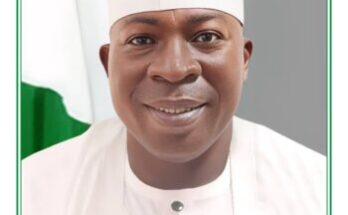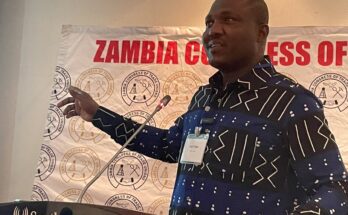Honourable Peter Akpatason represents the Akoko-Edo Federal Constituency, Edo state at the House of Representatives on the platform of the All Progressives Congress (APC). In this interview, the lawmaker, who is Chairman of the Committee on Civil Societies and Development Partners, speaks on the lingering agitations for restructuring of the country and expresses doubts on the sincerity and capacity of the National Assembly to address the issues. JOSHUA EGBODO brings excerpts:
There have been agitations across the country for true federalism. What is your take on the new dimension the calls are assuming?
A true Federal system has the legislative list that is structured along the pattern of exclusive, concurrent and residual. Each of these specifies the powers and areas each of the tiers of government can legislate on.
In a true Federal system ,the federating units which are the states and local governments operate with an amount of autonomy and commit to the center such taxes and royalties that are clearly defined in the constitution. But what we have today is a federalism that actually lacks in so many aspects.
One, there is no third tier of government in Nigeria. We only have two tiers. You have local governments that are mere appendages of the states,that do not have real powers. Also,the States do not have power in so many ways. In terms of resources management, resources are concentrated at the center and the states come to the center, cap in hands to beg for resources. So there is no fiscal federalism at the moment.
To me, it means we don’t have proper Federalism as yet. If you look at the legislative arm too,you discover there is much concentration of power in the center. The center legislates on virtually everything,leaving just little for local and state governments. The local governments are not doing anything in terms of proper legislation.
In a true Federal system, the local and state governments are supposed to legislate on a wide range of issues as opposed to what we currently have. That is similar to the devolution of power that people are clamouring for, that gives the state more powers to operate.
In a true federal system, states should have the power to operate at their own level, generate revenue and pay royalty to the center. In a true federal system, the sub federal levels are actually more powerful than the center. The center coordinates things that ought to be centrally coordinated, like immigration, customs, diplomatic missions, and so on. But what we have today in Nigeria, is a deviation from this.
There have been postulations that going by the operational constitution of the country, only the National Assembly has the power to entrench the much, expected true federalism. Do you subscribe to this assertion?
It is regrettable that as we speak, the voting during the recent constitution review tends to contradict what ordinarily is. The ideal is that the National Assembly has the power to clearly define true federalism, and legislate for the purpose of entrenching true federalism. But I have my doubts on the ability of this National Assembly as presently constituted to deliver on that because of the way lawmakers vote.
People do not vote because they believe that is the right way to go. People vote based on a lot of regional sentiments and other unpatriotic considerations. They don’t vote with patriotism to the center, but to regions and subregions. Whatever does not suit a region is not acceptable to such people.
It is not peculiar to one region. This is nationally, but it is not the right thing. We ought to put national interest first.
Are you saying the agitations may have been heightened after the National Assembly failed to ensure passage of the power devolution clauses?
Yes. The recent rising agitations might not be unconnected with the failure of the National Assembly to devolve power, to act objectively to ensure that those agitations are given a semblance of attention. When you vote against land use Act, you vote against devolution of power, what do you expect the people to do? The crisis will escalate and that is what we are having in the country today. So I have my doubts.
But don’t you see the current moves as renewed clamour for resources control or management?
Whether it is called resource control or resource management, they are playing politics with reality. What the people are after is to be involved in the process. We are talking about inclusiveness, we are talking about sub-units being part of this whole thing, rather than waiting for the centre to do the revenue gathering and at the end of the day, they go to the centre to share.
Nigerians need to realise that the reason we are failing is that we are all relying on oil, and it is a curse because God Almighty, whatever name you call him, has blessed this nation abundantly but we have decided to be blind to God’s blessings. That is why we cannot live well because we have decided not to respect God.
He has given us a lot of blessings. But we have closed our eyes to these blessings. Everybody is looking at oil. Oil comes with its own baggage of troubles. Oil money goes with a lot of issues. It promotes corruption. After you have established a well, it keeps producing money continuously, so the people become lazy, they feel it’s free money just coming, and corruption continues to grow. That is why we are where we are today.
Every state in this country, maybe with a few exemptions, are blessed with a lot of solid minerals, we have fertile soils everywhere. Agriculture alone can give us so much. Indonesia today, we are told came to NIFOR in Benin City to get palm seedlings and what they get from palm produce today is more than what we get from oil.
We have the land we have the people, we have everything that it takes, but then we are docile. We are oil dependent, we don’t seem to focus on the realty. We don’t seem to look at the real sector of the economy. We suffer degradation and we suffer all sorts of environmental issues. Why don’t you give us the opportunity to change the situation so that we can do it in a responsible way that our society will not suffer?
But do you think your suggested options will get wide acceptance?
Other people will not agree to this because they have failed to look at their back yards. I am from Akoko-Edo, in Edo north; one of the most blessed regions in Nigeria. My place is richly endowed but we have to go to Abuja to get a permit before we can touch any mineral there. At the end of the day, you see people from different parts of the country having the licenses, whereas, an Akoko-Edo person cannot get one.
I am not saying you must be from a particular place before you can get a licence but then, you must give some considerations; right of first refusal to the locals in some cases, but it doesn’t happen.
Let us not deceive ourselves about this whole thing. People say that Niger-Delta people hardly get oil licenses, and that is true. Others argue that they were considered for unproductive oil wells recently rejected by multinational companies. The question thus, is why the unproductive wells? Why not consider them for the big hectares that are pending allocations?
We have so much in other parts of the country, give people access to them too. Let’s look away from oil and harness other potentials and at the end of the day, everybody contributes to the centre. When everybody begins to think of oil, we will never be committed to diversification. We can be singing the slogan of diversification.
Will Resource Control ever see the light of the day?
Let’s have true federal systems, it will take care of the issue of resource control. I believe that true federalism is the first step to take but beyond that, Nigeria is so large, so diverse a nation that we even need to begin to look at a confederation, and not just a federation.



